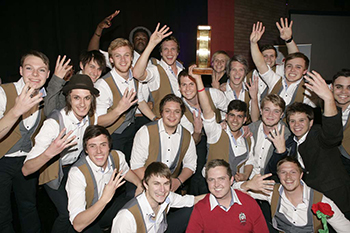
Veritas
Photo: Johan Roux |
Video clip
Facebook photo gallery
Following zealous performances during the rotations from 3-6 August 2015, Veritas and Marjolein made the cut to the finals, subsequently emerging as the Kovsie Kleinsêr (Sêr) 2015 champions.
This year’s Sêr had 10 male and 14 female residences competing for a limited number of places in the finals. With only five and six spots available, respectively, the competition was extremely tough.
The University of the Free State’s cultural calendar culminated in a taxing final battle on Saturday 8 August 2015, by courtesy of MacDonalds Bloemfontein. Veritas, Vishuis and Armentum from the male section as well as Marjolein, Sonnedou, and Roosmaryn contending as female counterparts sent a rhythmic ripple across the Bloemfontein Campus.
With these residences occupying the top three spots, adrenaline reached maximum levels as the groups competed for the crown and a place in the nationals. Spectators at the sold-out music event experienced world-class entertainment in all three venues: the Albert Wessels Auditorium, the Odeion, and the Kovsie Church.
On 29 August 2015, the champions are scheduled to test their strength against the universities of Pretoria, the North West, and Johannesburg at the nationals. The Stellenbosch University is to host this year’s Kleinsêr national competition, where the best will be crowned as South Africa’s Klêinser kings and queens.